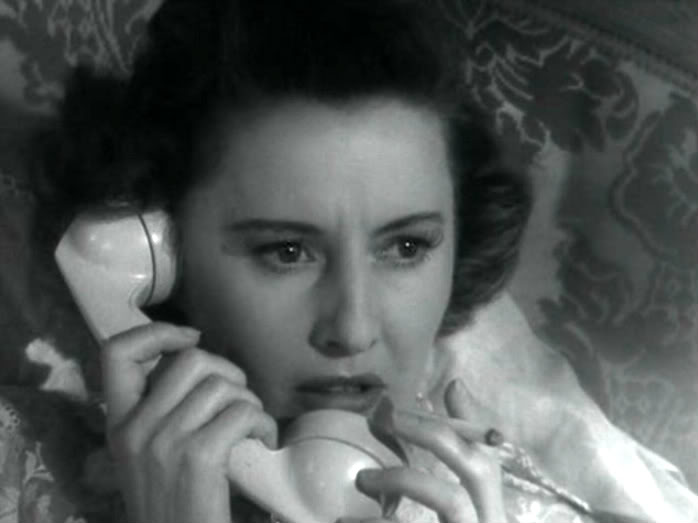Please welcome Kyle Stevens to The Film Experience team. You've previously heard him on the podcast, you can pre-order his book on Mike Nichols, and you should follow him on twitter as he is delightful. - Editor

Adapted from the hit radio play by Lucille Fletcher (who also wrote the screenplay), Sorry, Wrong Number follows Leona Stevenson, a headstrong young heiress who aims to one day be the sharpest battleaxe in the armory. She is also an invalid, relegated to her bed. We discover Leona telephoning inquiries into her husband’s whereabouts when the line fatefully clicks. She overhears a conversation between two men plotting a murder that night. For me, the whole movie hangs on the image of her listening to this narrative catalyst. It hovers over the entire film. Its power lets us never forget that this is Leona’s story, even when we get elaborate flashbacks from others. We recall it later when we see Leona disheveled and shining from tears and anxious sweat. Its tightness contrasts with the way the camera later wanders in and around people, tracing the distances between them that the telephone extinguishes.
The magic here is all down to Barbara Stanwyck, giving one her best performances (and receiving the last of her four Best Actress nominations). We see Leona’s selfishness ebb as she intelligently listens to the heavies on the line. That is, Stanwyck doesn’t play an inner monologue. Her bright brown eyes and horseshoe furrows do not propose “Oh no!” and “What should I do now?”, as though telling us what Leona wants to say. Rather, Leona, in this moment, and for a change, is not about herself at all. She just listens. This remains a thing of beauty, reminding us how much intelligence just listening can demand. I don’t know of a better demonstration of the cliché that listening is one of those feats accomplished by only the best actors.
Written by a woman and showcasing a female character who fights for what she wants, Sorry, Wrong Number would probably be received as a feminist statement were it released today. But in the moment in which Leona hears unheard, I am reminded that it is not just the film’s gender politics that remain relevant. Over the complex lines of a switchboard (where, according to Hollywood, women controlled the flow of information), the epigraph warns:
In the tangled networks of a great city, the telephone is the unseen link between a million lives… It is the servant of our common needs—the confidante of our inmost secrets…life and happiness wait upon its ring… and horror…and loneliness… and death.”
The technology behind our phones may have changed, but in an age where we’d rather text than talk, we seem to still fear verbal connections. We worry about who’s listening, and we know, deep down, that the voice can give too much away.
Previously
Vintage 1948 - Best of the Year
Supporting Actress Smackdown - The Schedule